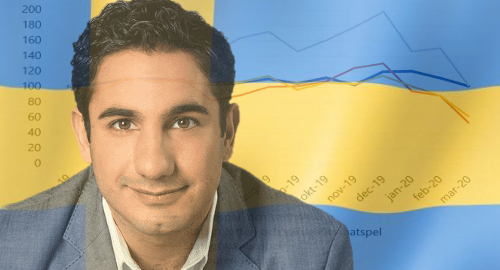 Sweden’s new online casino restrictions are being challenged by a local politician who accused the minister responsible of misrepresenting the facts regarding gambling activity.
Sweden’s new online casino restrictions are being challenged by a local politician who accused the minister responsible of misrepresenting the facts regarding gambling activity.
Last week, Sweden imposed new temporary deposit and spending restrictions on online casino play first proposed by Social Security Minister Ardalan Shekarabi at a press conference on April 23. But John Weinerhall, a parliamentarian representing the Moderate Party, is asking the government to investigate whether Shekarabi (pictured) knew at the time that the facts didn’t support his argument.
Shekarabi’s rationale for proposing the restrictions was to protect consumers from harm during the COVID-19 pandemic lockdown, a period in which he claimed Sweden’s online licensees were seeing “strong progress” in online casino activity.
But following Shekarabi’s April announcement, Sweden’s Spelinspektionen gambling regulatory agency released statistics showing a decline in overall gambling activity since the lockdown began. Weinerhall said last week that email exchanges showed that the government was aware of this data five days prior to Shekarabi’s April press conference.
Weinerhall is calling on the Constitutional Committee, which has responsibility for scrutinizing ministerial activity, to investigate what Shekarabi knew and when he knew it. Weinerhall said he was prompted to act due to his view – shared by many Swedish operators – that the restrictions will reduce the government’s ability to ‘channel’ customers to Swedish-licensed online casinos.
COVID-19 STUDY SHOWS OVERALL DECREASE IN GAMBLING
A recent Lund University study of Swedish gambling activity during COVID-19 found that only 4% of participants reported gambling more during the pandemic, while 51% reported no change, 7% gambled less and 38% neither gambled before or during the crisis.
Following the suspension of major sports events, 2% of gamblers reported gambling more on other sports, 6% placed more racing wagers, 5% bet more on other games and 4% played more online casino games. However, 19% reported gambling less while 69% said they weren’t affected because they didn’t bet on sports.
The study’s authors noted that while the vast majority of participants didn’t show any worrying rise in gambling activity, those who reported gambling more following the sports halt had “very high rates of gambling problems.” The authors concluded that “a sub-group of individuals with high vulnerability … may need to be targeted with interventions.”
It’s worth noting that the individuals who displayed these problematic gambling tendencies also had “increased alcohol use during the pandemic, even when controlling for several other potential risk factors.” That dovetails with countless studies indicating problem gamblers have difficulty controlling all sorts of impulses, likely due to different brain chemistry.
SPELPAUS SPREADS THE NEWS
Spelinspektionen announced last week that it was launching a new awareness campaign of its Spelpaus online gambling self-exclusion registry. The regulator said that only around half of gamblers were aware of the registry, despite it having launched last year in tandem with the country’s new regulated online market.
On Monday, Spelinspektionen launched a new Spelpaus awareness campaign featuring seven different responsible gambling messages, three of which will appear in Swedish television commercials, while the rest will be disseminated via online ads and social media platforms.